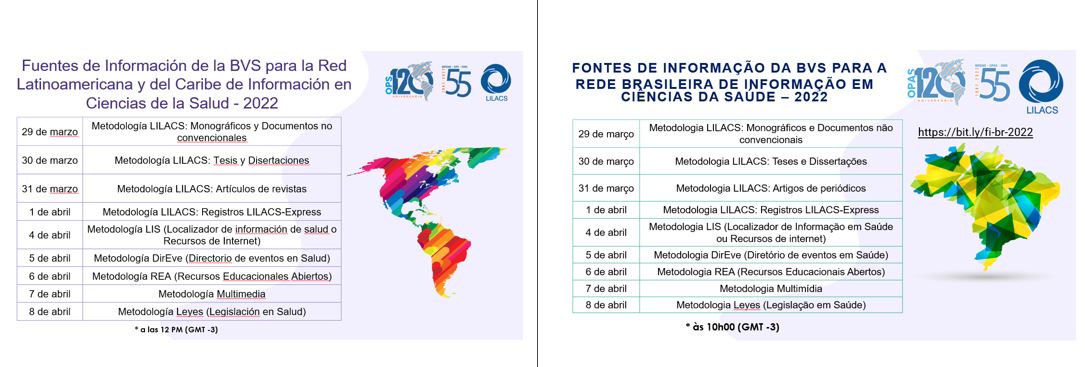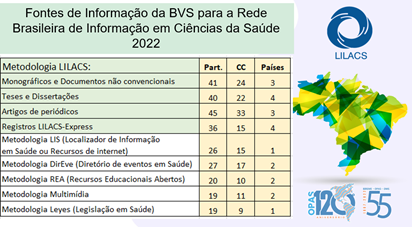With the objective of strengthening the Latin American and Caribbean Network on Health Sciences Information and the Brazilian Network on Health Sciences Information, from March 29 to April 8, virtual training sessions on the Information Sources of the Virtual Health Library (VHL) were held, totaling 9 sessions in Portuguese and 9 in Spanish.
The aim was to stimulate critical reflection and analysis of the documentation according to the characteristics of each Information Source and, observing its methodology, to train information professionals and journal editors to cooperate with the databases with the expected quality and in the appropriate time to disseminate their scientific and technical production.
The Information Sources addressed in these sessions were: Bibliographic records, used for management of LILACS, BDENF, ColecionaSUS and other bibliographic databases that adopt LILACS Methodology; internet resources for management of the Health Information Locator (LIS); events, for management of the Directory of Events (DirEVE); multimedia, for management of videos, audios, and others in the Multimedia Catalog; educational resources, for management of courses and learning objects in the Repository of Open Educational Resources; and legislation, for management of laws, decrees, and normative acts in Health in “Leyes” (Fig. 1).

The training also explained the criteria for information sources at the regional level, and each database has criteria appropriate to its context. Therefore, it is necessary that the institution (Cooperating Center) that wants to contribute to a certain database contacts the coordinating institution responsible for its management. For example, the nursing database (BDENF) is coordinated by the Universidade Federal de Minas Gerais, which is responsible for establishing and updating the criteria of this database.
The sessions had specific facilitators. Sueli Mitiko Yano Suga, supervisor of the Reference Information Sources area at BIREME, opened the virtual sessions and facilitated the LILACS Methodology and Multimedia sessions for the Latin America and Caribbean (AL&C) network.
Angélica de Souza Alves de Paula, Reference Information Sources Librarian at BIREME, facilitated the sessions on the LILACS-Express initiative of LILACS Methodology and on Legislation, in Portuguese and Spanish.
Elizabeth Biruel, Cooperative Information Services Librarian at BIREME, facilitated the session on Open Educational Resources for the Brazilian and AL&C network.
Lais Silva, Reference Information Sources Librarian at BIREME, facilitated the sessions on LILACS Methodology (theses and dissertations, monographs and unconventional documents, and journal articles) and LIS/DirEve for the Brazilian network.
At the end of the AL&C network training sessions, we counted with the participation of 430 participants from 210 Cooperating Centers from 19 countries (Argentina, Bolivia, Brazil, Chile, Colombia, Costa Rica, Ecuador, El Salvador, Spain, Guatemala, Honduras, Mexico, Mozambique, Nicaragua, Paraguay, Peru, Dominican Republic, Uruguay, and Venezuela). See the number of participants per session (Fig. 2).

In the Portuguese trainings, there were 283 participants from 156 Cooperating Centers from 7 countries (Brazil, Bolivia, Colombia, Ecuador, Mozambique, Dominican Republic, and Uruguay). See the number of participants per session (Fig. 3).

The participation in the trainings generates 30-hour certificates to the participants, if the requirement of submitting 30 records is fulfilled, as a form of cooperation to one or more VHL databases.
The documentation for the trainings is available for consultation:
- VHL Information Sources for the Brazilian Network on Health Sciences Information, 2022 (in Portuguese). Available from: https://bit.ly/fi-br-2022.
- VHL Information Sources for the Latin American and Caribbean Network on Health Sciences Information, 2022 (in Spanish). Available from: https://bit.ly/fi-alyc-2022.
The training courses held annually are a space for learning and keeping up-to-date on the Information Sources methodologies, which are continuously revised to meet the changes that occur in the scientific scenario and also become a space for discussion and reflection among professionals from the Cooperating Centers, journal editors, and BIREME.
Developing the capacity of professionals working in cooperation contributes to strengthening the institutions and increasing the visibility and access to scientific and technical production in Latin American and Caribbean countries.